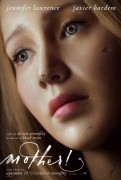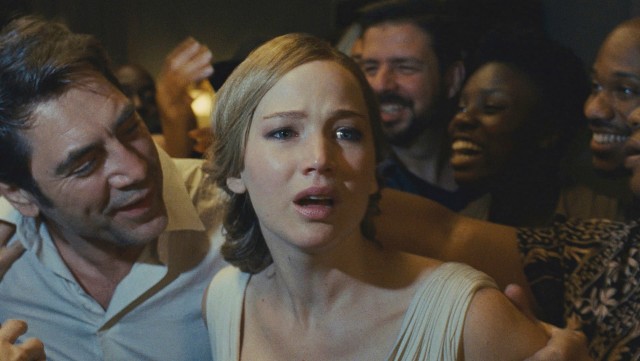mother! Movie Review
 |
mother!
Theatrical Release: September 15, 2017 / Running Time: 107 Minutes / Rating: R Writer/Director: Darren Aronofsky Cast: Jennifer Lawrence (Mother), Javier Bardem (Him), Ed Harris (Man), Michelle Pfeiffer (Woman), Brian Gleeson (Younger Brother), Domhnall Gleeson (Oldest Son), Jovan Adepo (Cupbearer), Amanda Chiu (Damsel), Patricia Summersett (Consoler), Eric Davis (Bumbler), Raphael Grosz-Harvey (Philanderer), Kristen Wiig (Herald) |
mother! looked like it would be for me Having just seen the movie, I still don't have answers to those questions. For about an hour, mother! is a prestige picture you could imagine drawing some awards attention. And then it becomes something very different, something bizarre that the general public will hate and even open-minded critics who greatly value unpredictability will have a hard time defending. I know I can't.
mother! is set in an old country estate where a married couple lives. The man (Javier Bardem) -- no characters are named in the film -- is a poet suffering from writer's block. The woman (Jennifer Lawrence) is deeply invested in restoring the old house, which is itself a full-time job. At night, an older orthopedic surgeon (Ed Harris) stops by. His relationship to the man of the house is unclear, but the surgeon accepts an invitation to stay, to the woman of the house's concern. The next day, the surgeon's wife (Michelle Pfeiffer) drops by and adds alcoholic lemonade and much judgment to the mix.
After the upper middle-aged couple destroy the poet's prized, delicate crystal into a hundred little pieces, the young wife tries to get them to leave. Instead, the older couple's two adult sons (Brian and Domhnall Gleeson) drop by, distraught over the will of the father that favors one over the other. The bickering does not just bring discord into our childless principal couple's home, it also brings destruction. We cower with Lawrence's heroine as chairs are smashed, floors are scuffed, and blood flows everywhere.
This is around the time the movie completely changes. What began as an uneasy psychological drama in which no one was quite as normal and content as they seemed devolves into straight up black comedy and apocalyptic horror. It's hard to even think of something to compare this second half to. There were elements of horror in Black Swan, Aronofsky's first film to receive major accolades and mainstream acceptance, its inflation-unadjusted $330 million worldwide gross still something of a shocker seven years later. mother!, though, makes Black Swan look like child's play. It's just flat out bonkers and when you think it can't get any crazier, it does. It's Rosemary's Baby on acid and though I'd love for that to be a pull quote, I certainly don't mean it is a compliment.
What grabs your attention the first time -- the lovingly restored old home (which is practically a leading character, despite being dismissed as "setting" by Pfeiffer's troublemaker) getting caught in the crosshairs of a violent family dispute -- loses impact as it happens again and again, The film is not exactly an addition to the house in peril genre, which seems best represented by the comedies The Money Pit and Home Alone. Aronofsky's movie, only the second to credit him as a writer since 2006, is using the house as a metaphor as it explores the problems affecting our lead May-September couple. Unfortunately, that couple's problems do not make for a terribly interesting study. Their different personalities, lack of affection, and different views on family building seem like they're designed to lead somewhere, but they don't. We only end up with madness that you wouldn't believe if I described it to you.
That's unfortunate, given the talent assembled here on both sides of the camera and given that the first hour is compelling, original fare.
|
Related Reviews:
DVDizzy.com | DVD and Blu-ray Reviews | New and Upcoming DVD & Blu-ray Schedule | Upcoming Cover Art | Search This Site
DVDizzy.com Top Stories:
Directed by Darren Aronofsky: Black Swan • Noah
Now in Theaters: It • American Assassin • Wind River • Logan Lucky • The Trip to Spain
Jennifer Lawrence: Joy • Silver Linings Playbook • American Hustle • Passengers | Javier Bardem: No Country for Old Men • The Counselor • Eat Pray Love
Michelle Pfeiffer: People Like Us • Dark Shadows • Scarface | Ed Harris: Snowpiercer • The Firm • State of Grace • The Adderall Diaries
Rosemary's Baby • Love Streams • Good People • Anomalisa • A Ghost Story
Text copyright 2017 DVDizzy.com. Images copyright 2017 Paramount Pictures, Protozoa.
Unauthorized reproduction prohibited.
